Job Approval of the New Government: 51% approve vs. 19% disapprove
November 30, 2015
Remarkably Few Unhappy with New Government

While less than half of Canadian voters marked a ballot for a Liberal candidate, only 19% are unhappy with the performance of the Trudeau government so far.

This view cuts across regional, demographic and political lines to a remarkable degree.
Demographically, there is little difference in overall approval with 49% of men and 52% of women saying they approve of the job the federal government is doing. Only about 1 in 5 disapprove. A majority or large plurality of Canadians across all age groups also approve including 56% among those aged 18 to 29 and 54% of those aged 60 and over.
Regionally, Atlantic Canadians (66% approve), Ontarians (54% approve), Quebecers (50% approve) and British Columbians (50% approve) are the most likely to approve of the job performance of the federal government. Even in Alberta, more respondents approve (38%) than disapprove (34%).
Almost 6 in 10 NDP voters approve of the job the federal government is doing, as do 47% of Green voters, and 31% of BQ voters. 81% of those who voted Liberal approve of the federal government’s job performance thus far. Among Conservative voters, 16% approve while 48% disapprove. The rest say they neither approve nor disapprove.
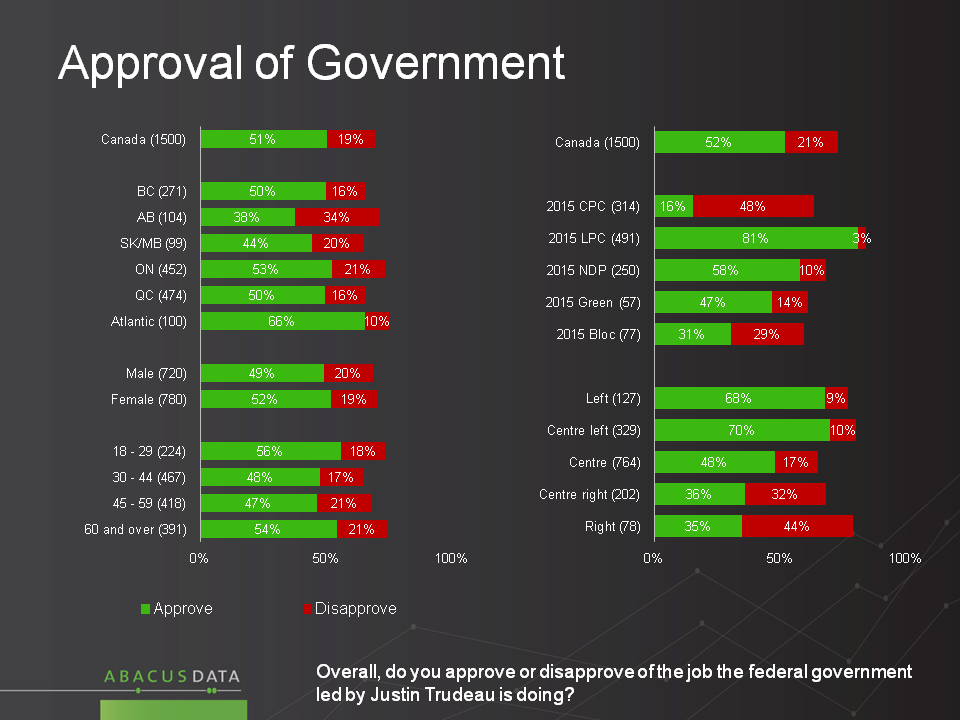
Detailed Performance Assessments
We asked respondents to rate the performance of the new government on 11 different criteria. Large majorities said they thought the government was doing an acceptable or good job on all 11.
Strongest ratings were for “openness and accessibility” where 62% said Mr. Trudeau was doing a good job, and another 31% said “acceptable”. Only 8% gave the PM negative ratings on this criteria.
While his critics said that Mr. Trudeau would embarrass the country internationally, Canadians have reacted differently. 55% give him a good rating, 31% acceptable and only 14% negative when it comes to the way he has represented Canada on the international stage (Note – this survey was taken after his participation in the G20 meeting).
Similarly good reactions were found on the “values he is showing in how he handles his job” the “choices he made in appointing his cabinet, and “his approach to working with the provincial premiers.” In each case, no more than 12% of the public give the PM a poor rating (Note- the survey was partially in the field after the First Ministers’ Meeting ended on Monday).
On his “approach to climate change and greenhouse gases”, the PM gets good marks from 37%, acceptable from 39%, and negative reviews from 13%.
On handling the economy and tax dollars, 77%-79% are satisfied.
One of the two weakest ratings for the PM was on his approach to dealing with the question of refugees, where 33% offered a poor rating (The timing of the survey was before the government announced that it would stretch its timetable to settle refugees into the new year).
The other weakest rating is on his “approach to dealing with the threat of ISIS”. On this item, 35% give the PM a good rating, 34% acceptable, and 31% a poor rating.
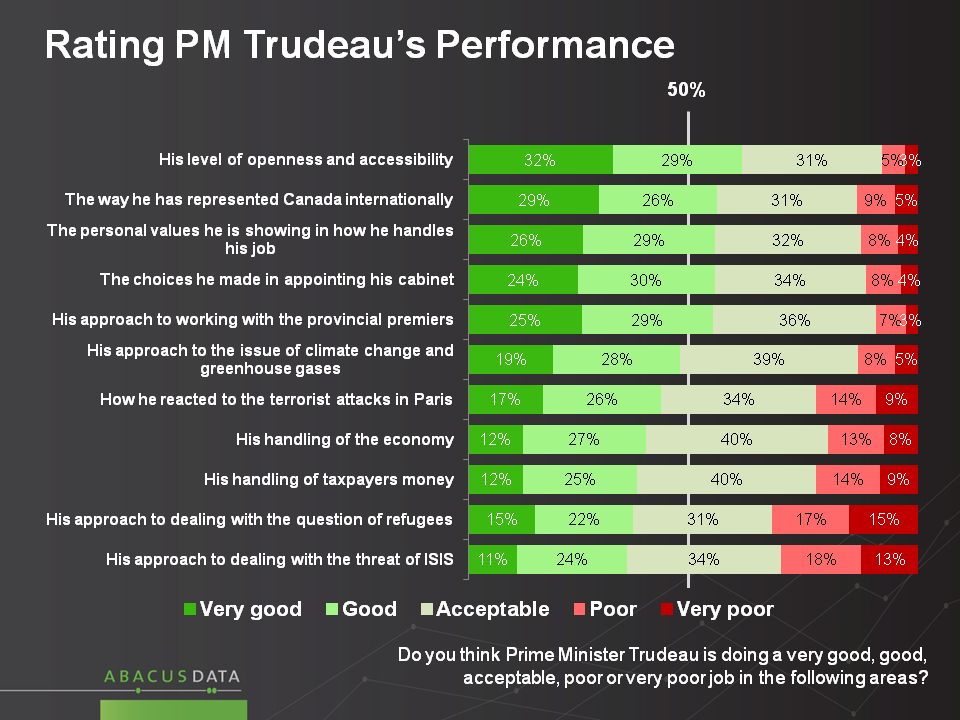
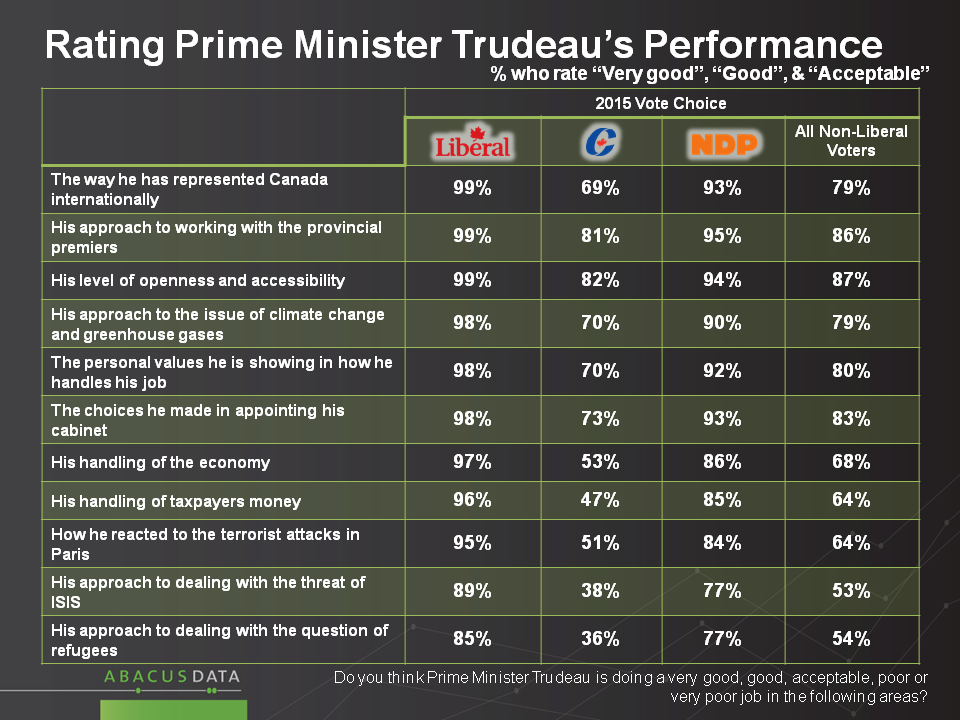
For the most part demographic patterns are consistent on these performance assessments. The following charts show the patterns on five of these assessments: representing Canada internationally, his handling of climate change, ISIS, refugees, and his approach to appointing his cabinet.
When it comes to his approach to the issue of climate change and greenhouse gas, evaluations are consistent across demographic groups. Atlantic Canadians, Quebecers, and Ontarians are most likely to rate his approach as very good or good. 30% of only three subgroups (Albertans, Conservative voters, and those who self identify as on the right) give Mr. Trudeau poor marks for his approach to climate change.
In terms of dealing with ISIS, seven out of ten (69%) rate Mr. Trudeau’s performance as at least acceptable and this is consistent across all age groups and genders. Among Conservative voters, 10% rate his performance as good or very good, 28% rate it as acceptable while 62% believe Mr. Trudeau’s approach is poor or very poor. When it comes to ideology, those on the left are most likely to favour Mr. Trudeau’s approach while those on the right are less likely to. That being said, 35% of those who self-identify as being on the right of the spectrum rate his performance on dealing with ISIS as good or very good.
Few give Mr. Trudeau poor marks on the choices he made in appointing his cabinet. There was little demographic or regional variation. Most Conservative voters (72%) even found his choices to be good or acceptable.
A majority of Canadians (55%) rate Mr. Trudeau’s performance internationally as good and these feelings are consistent across demographic and regional subgroups. Even a majority who self-identify as being on the right of the political spectrum are generally satisfied with his performance.
Finally, when it comes to his approach to dealing with the question of refugees, there is little overall variation beyond political support. 64% of Conservative voters felt Mr. Trudeau’s approach is poor or very poor while 36% felt it was good or acceptable. Most Liberal voters (85%) and NDP voters (77%) find Mr. Trudeau’s approach on the refugee file to be good or acceptable.
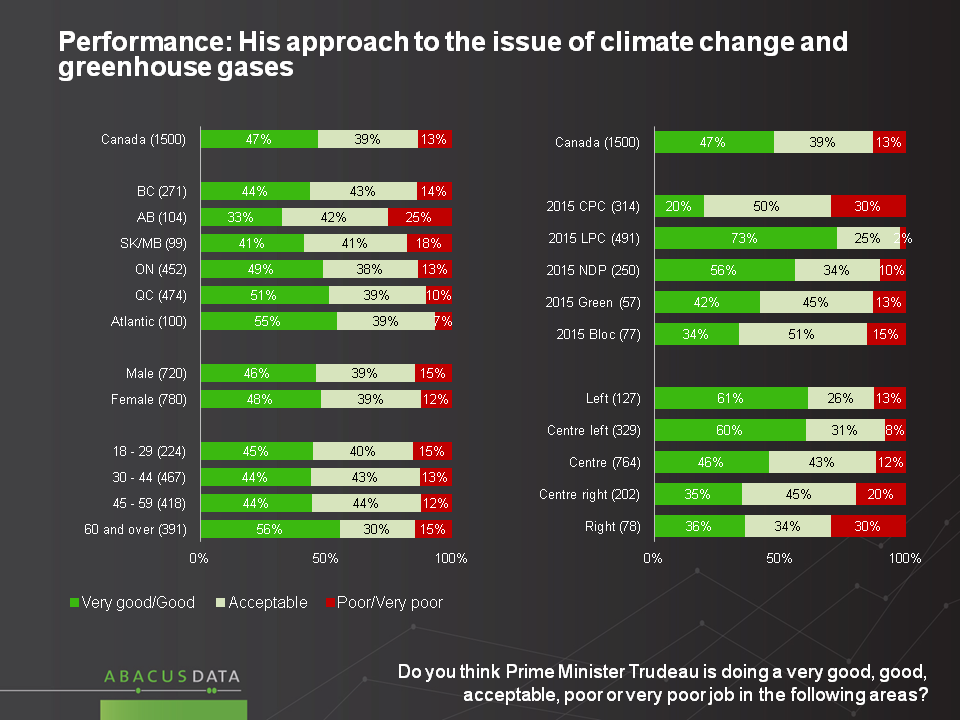
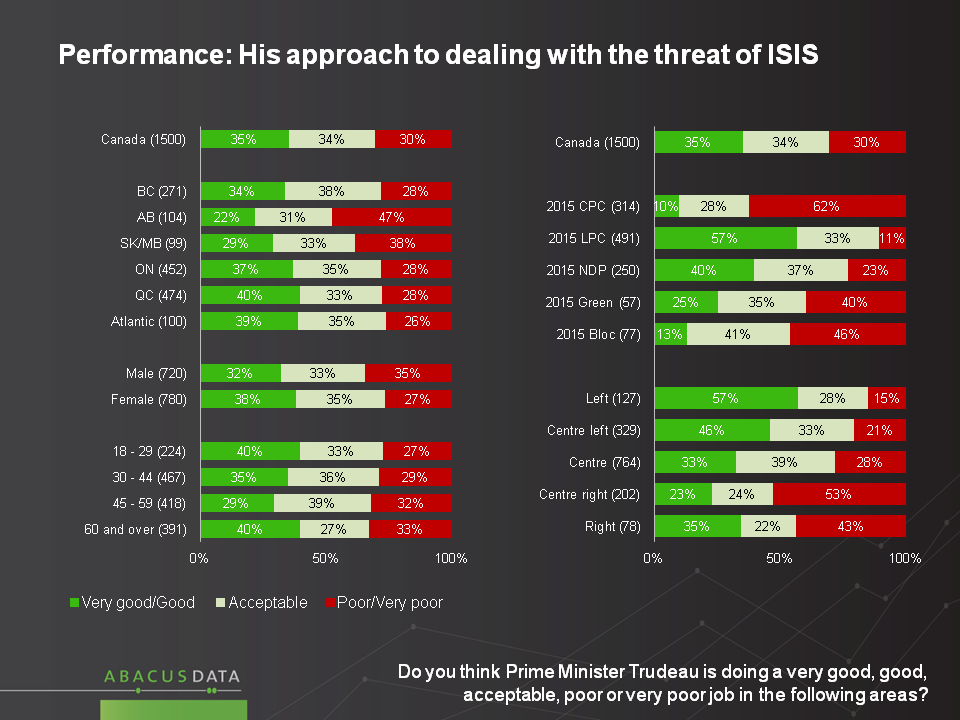
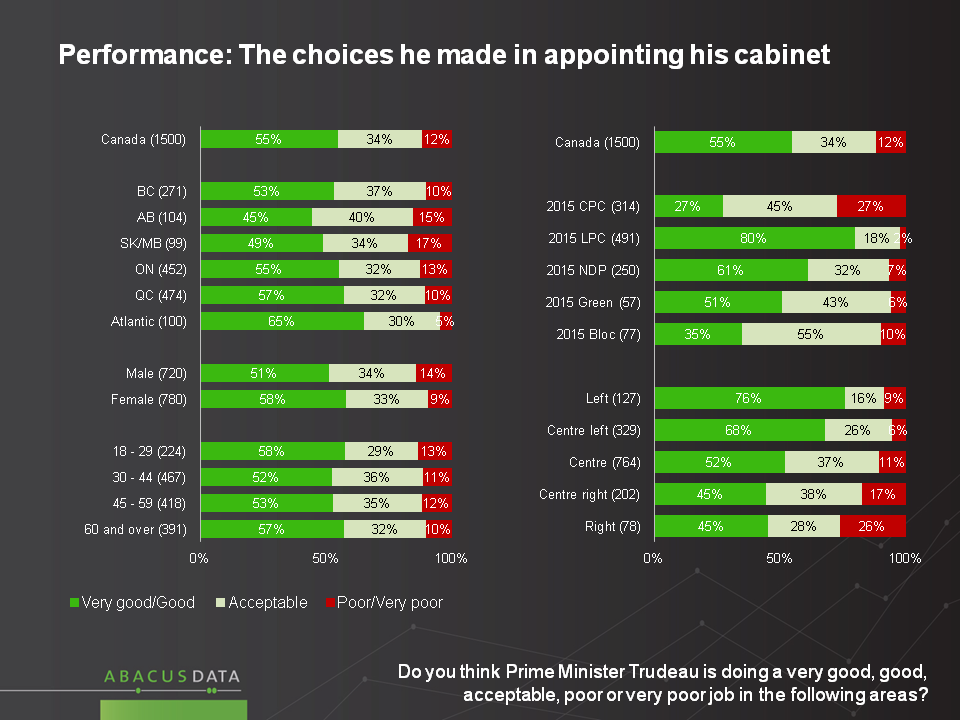
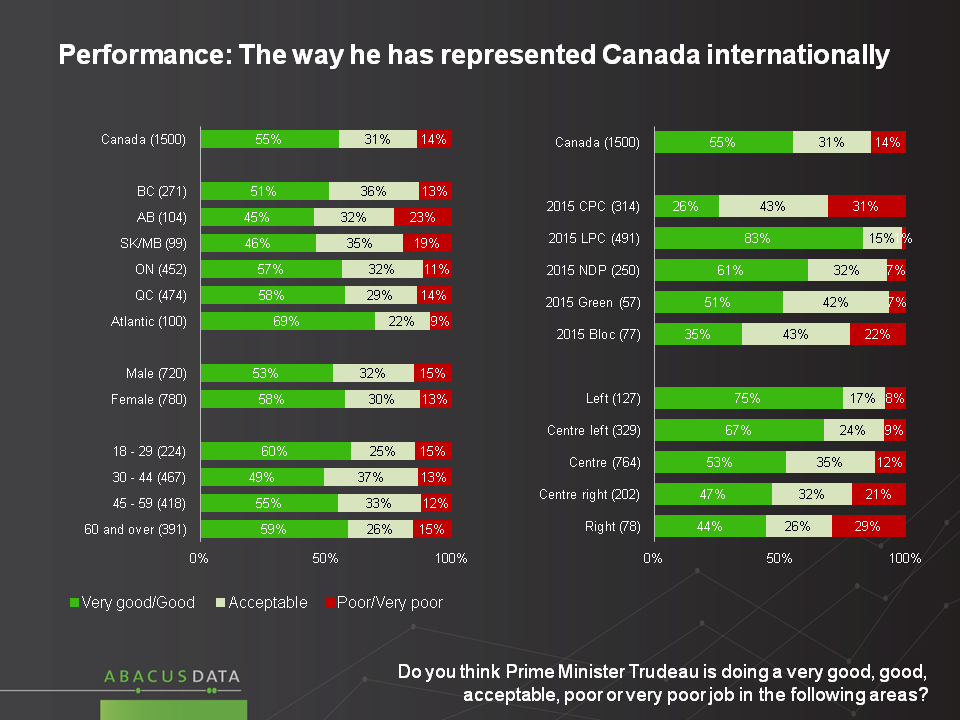
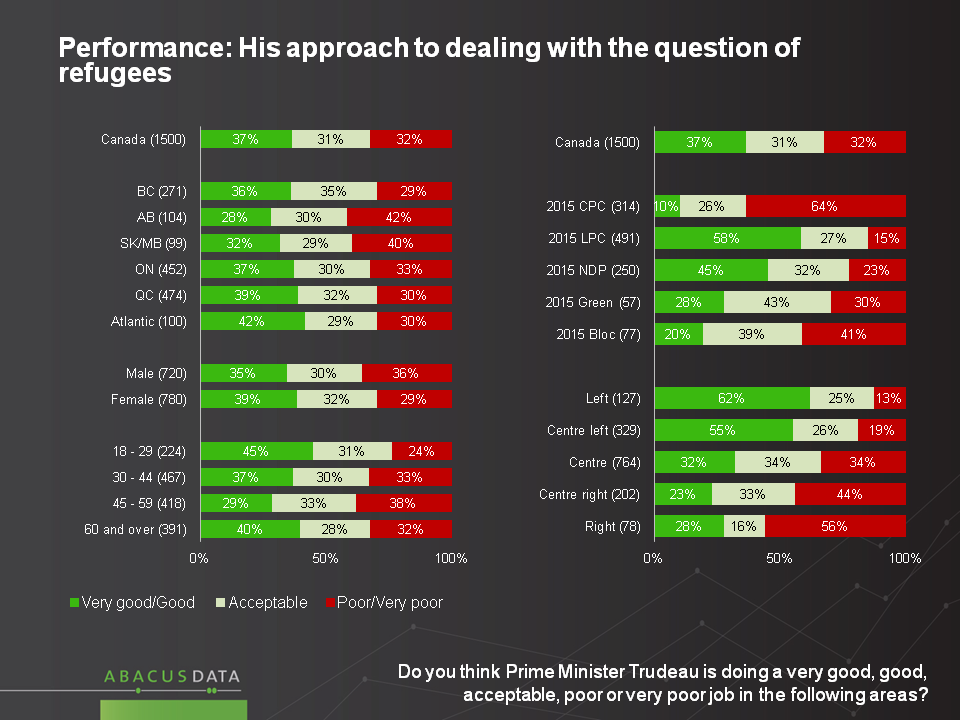
The Upshot
Throughout this survey it is clear that people for the most part believe that Mr. Trudeau is handling his responsibility as PM in a way they find acceptable. The shape of these responses seems less a function of them having had low expectations based on his critics “he’s not ready” mantra and more a reaction to the way he has put his government in place, the choices he made in appointing a cabinet, his apparent determination to be more accessible, and his manner representing Canada abroad.
These numbers suggest that opposition criticisms of the various steps the government has taken so far have landed weakly – Canadians seem to be forming their own opinions, and positive ones for the most part.
This is even true on the complex issues of what to do with the threat of ISIS and how to respond to the refugee crisis. Even in these two areas, while most people didn’t vote for Mr. Trudeau, most people find his handling of these issues acceptable or better.
Methodology
Our survey was conducted online with 1,500 Canadians aged 18 and over from November 23 to November 25, 2015. A random sample of panelists was invited to complete the survey from a large representative panel of over 500,000 Canadians, recruited and managed by Research Now, one of the world’s leading provider of online research samples.
The Marketing Research and Intelligence Association policy limits statements about margins of sampling error for most online surveys. The margin of error for a comparable probability-based random sample of the same size is +/- 2.6%, 19 times out of 20. The data were weighted according to census data to ensure that the sample matched Canada’s population according to age, gender, educational attainment, and region. Totals may not add up to 100 due to rounding.
Abacus Data Inc.
We offer global research capacity with a strong focus on customer service, attention to detail and value added insight. Our team combines the experience of our Chairman Bruce Anderson, one of Canada’s leading research executives for two decades, with the energy, creativity and research expertise of CEO David Coletto, PhD.




